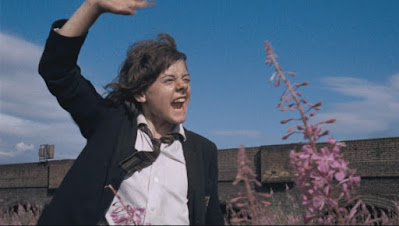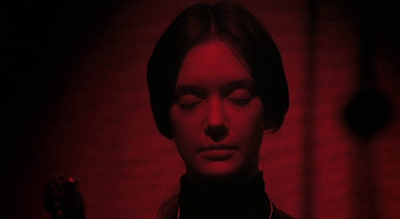This is a film I remember being promoted in my sister’s Jackie magazine probably because of the presence of Jack Wild who had become a teenage pin-up after playing the Artful Dodger both on stage and then in the film Oliver (1968) before then staring in the American TV series H.R. Pufnstuf. He was slightly older than his parts and in Melody he was a 17-year old playing 13 alongside fellow Oliver alumnus Mark Lester (12 during filming in May 1970) and Tracy Hyde (who had just turned 11).
Wild had been discovered playing football by June Collins
– mother of fellow child actor Phil… who signed him up for the Barbara Speake
Stage School along with his brother Arthur. He certainly had his moment but did
get tired of playing kids as he entered his twenties and, according to his
obituary in the Daily Telegraph, was already an alcoholic by 21. His undoubted
talent – a high-energy screen presence with subtlety and wit – was undermined
by such casting and despite the occasional TV and film role, most of the rest
of his shortened career was spent in theatre.
In this film, originally titled S.W.A.L.K. (Sealed With a Loving Kiss) he’s very convincing as young tearaway Tom Ornshaw and helps to bring out the best from Lester and Hyde who also do well on their own as Daniel Latimer and the titular Melody Perkins, pre-teenagers in love. The film popped up on Talking Pictures and, after a half century I finally got to watch what I had only read about in the above-mentioned copy of Jackie…
.jpg) |
| One of these two could drive a car and go to the pub... |
The script was from Alan Parker and he has said it combined elements of his own childhood experience in Islington as well as that of producer David Putnam. Given the significance of these gentlemen’s later careers it’s clear to say that Melody, despite only really being a big hit in Japan, set them on their way. For Parker, who was second unit director for some scenes, it gave him the desire to make more films and to direct whilst for Putnam, the film kept his fledgling production company afloat.
There are so many things to recommend the film, not least the slice of South London life it offers as background – Lambeth in 1970 – as well as the little-changed Weymouth sea front in one sequence. It’s also a very well-made film with director Waris Hussein marshalling his younger cast well and portraying the matter of “love” in a convincing way. As Melody says at one point as she and Daniel are interviewed by the headmaster – James Cossins on superb form – they want to be together but “we don’t really understand…”
I can only relate having been smitten with classmate Julie Barton aged 11 and spending my weekends longing for Mondays and the sight of her freckled face in assembly. Unlike Daniel though I was barely able to speak to Julie and any chances were dashed when I went to a local comprehensive and she moved. It’s fine… I’m over it now!
 |
| Sheila's here! |
Like me perhaps, Daniel is a quirky lad, and how could he not be with a mother played by the great Sheila Steafel and a step-father (Keith Barron) who seems continually annoyed with him. At one point Tom sets fir to his newspaper and is sent to his room where his mother soon forgives him, over-compensating perhaps. Daniel befriends Tom who is from different social circumstances and has to look after his Grandad after school, and, after sweetly suggesting that his mother might help, Daniel offers his help after she’s side-tracked by a Women’s Institute meeting.
The pal’s friendship is soon challenged by Daniel’s growing attraction to Melody, a development he isn’t yet capable of verbalising as the two hover around each other as much in fear as affection with the jeers of their immature classmates an ever present guarantee… There are so many moments of recognition and shared embarrassment you watch this with your inner, half-remembered childlike wonder at the unknown and uncertain connections you make that only grow in complexity as you mature.
 |
| Jack goes Wild! |
The leads are only a handful of years older than me and so, this is almost my generation and the locations and fashions – almost invisible at the time – now bring that sharp pang of nostalgia to accompany the recognition of painful lessons learned. Hussein paces the story well and the central love is woven through many funny incidents of school life, from the bullying history teacher (played by Scouser Ken Jones who was so very good at playing unlovely!), to the boys’ attempt to make an explosive using weedkiller which fail repeatedly on the wastelands near Clapham Junction. Turns out making a bomb is just as mysterious as establishing a romantic connection with the opposite sex: trial and error no matter how much study is undertaken.
The supporting cast of adults is superb, creating a school full of oddball teachers who to paraphrase Tom, want to be in charge but also their friends after a school disco throws everyone together. We also have Roy Kinnear and Kate Williams as Melody’s parents and both are as good as you remember – I found myself wishing Kate had done more Ken Loach films after playing Beryl in Poor Cow, such a fine actor and what a long career she is having! Hilda Barry is also fab as Grandma Perkins, all Nans looked like her in 1971…
There’s a soundtrack featuring five songs from the Bee Gees and, surprisingly, Crosby, Stills, Nash & Young singing Graham Nash’s Teach Your Children to end the film on a suitably poignant note. That sounds more 1971 to me than the brothers Gibb who are still in their post-psychedelic baroque period sweet though their songs are, especially Melody Fair which gives the film it’s title and main character. Pop music moved so quickly in those days and I remain acutely aware of every shift I remember and I do recall the First of May, one of the twoBee Gee hits from the film and released in 1969. By 1971 though, it’s all change and time for some noise with T-Rex, Slade and The Sweet!
Dusty Verdict: Melody is a time capsule in
so many ways but still resonates with the eternal truths of developing
childhood. It takes some skill to make a film like this with children who may
not have experienced anything like it before and that’s a tribute to the
writing and direction. The film’s success in Japan and elsewhere overseas
helped return a profit and opening the way for Puttnam and Parker to refresh
British film over the next decade and it remains influential with Wes Anderson
saying it inspired Moonrise Kingdom. It’s well worth a watch and is
available on TPTV as well as Blu-ray.
And you, of tender years
Can't know the fears your elders grew by
Help them with your youth
They seek the truth before they can die
Crosby Stills Nash & Young Teach Your Children (Nash)
.jpg)







